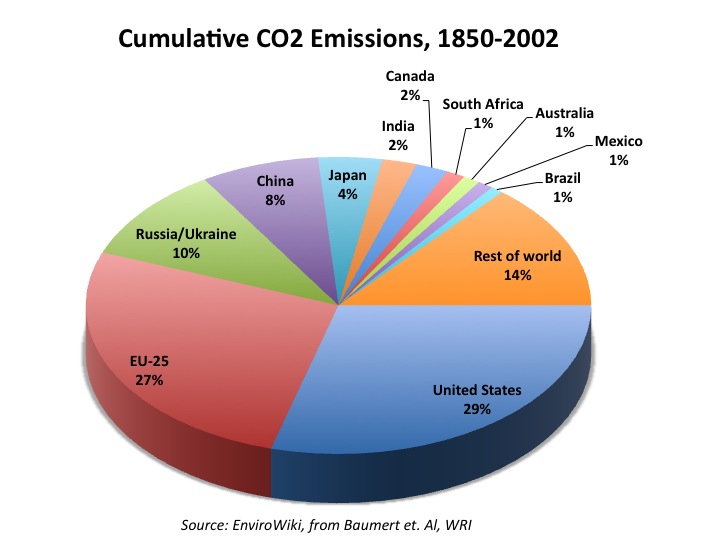The world is meeting in Cancun this week to talk climate change. Is there any hope of a large-scale agreement on capping emissions around the world? Most pundits would say no.
Why can’t we agree to do something? The answers are varied and all contain some truth. There are, for example…
* The inherent challenges of tackling a problem so diffuse and long-term with responsibility laying with all 7 billion of us
* Psychological barriers to change
* A media that paints all issues as having two equal sides even if it’s 99 to 1
* Powerful, vested interests in the old, fossil-fuel-based economy
* The fact that the U.S. has no federal climate policy, which makes global negotiations nearly impossible. (And with the recent U.S. election bringing to power more climate deniers, we’re moving further away from ever having a federal policy.)
All of these problems, and many more, contribute to the repeated failure of global climate summits. But the hurdle that keeps coming up year after year and is perhaps the hardest to get over is the radical difference in perspective between the developed world and the up-and-coming powerhouses of China, India, and Brazil.
I spoke at a meeting of corporate execs in Beijing a couple of weeks ago and got a glimpse of these different viewpoints. Before my talk, a Chinese academic gave an overview of climate science and policy. He spoke in Chinese, so I understood little (ok, none) of the language, but the charts he put up were crystal clear…carbon dioxide levels over time, commitments for greenhouse gas (GHG) reductions by country, and so on.
But first he set the stage with a chart that gets to the core of the issue. It’s data that we rarely discuss in the West, but seems to be pretty important over there. I’m talking about the cumulative CO2 emissions, by country, since the industrial revolution.
In his version, China was responsible for a tiny sliver. I looked up the numbers myself and created the pie chart below – it may not be perfect, but it’s close enough. China is responsible for about 8% of the historical emissions from 1850 to 2002, but clearly the developed world is primarily responsible for the climate problem to date.
————————————————

————————————————
This historical responsibility is irrefutable. But at the same time, the projections for emissions growth show that the new economic powers will be contributing the lion’s share going forward. According to the International Energy Agency, China will be responsible for over one-third of the worldwide growth in energy demand over the next 25 years (full pdf report here).
This reality about future responsibility has been very convenient for those who want to drag their feet on climate action; it was one of the main reasons President Bush used to avoid climate negotiations. Why should we join the Kyoto Protocol, he’d say, if China and India don’t have responsibilities?
This is not a new debate, especially to anyone who has watched the climate policy world at all. But I still found it useful to be reminded of the historical figures. It’s sort of surprising to see it in hard numbers…and it explains so much.
Here’s the crux of the problem: When the West/North says, “you will be the largest emitter going forward, so you have to cut back” and the East/South says, “you created the problem, so you should go first,” they’re both right. Can you think of a tougher situation for negotiation than when both parties are absolutely correct and yet their positions are so far apart?
But the reality is that Nature doesn’t care who started this. When you find yourself in a boat that’s leaking and sinking, you start bailing. You can’t spend too much time worrying about who poked the hole. So while I believe the developing world’s moral position is unimpeachable, it doesn’t matter. The science will win, and the data tells us that putting any more carbon in the air is incredibly dangerous for our species. So everyone has to change.
I’d like to think that the world is moving away from these old debates, but they’re still seething not too far from the surface. China’s negotiating position in Cancun, according to the New York Times, is that the West should cut emissions, pay for the shift to a cleaner economy, and provide technologies to developing countries. Again, this is sort of hard to argue with – everyone must bail out the boat, but the responsible parties can pay for buckets. But given the fiscal and political realities in the developed world, us paying more for anything seems remarkably unlikely.
So my hope is what it always is: the business community will take the lead from the governments of the world and continue investing in and implementing clean technologies, regardless of the success or failure of the global negotiations.
Given how deeply felt the convictions are on every side – and the fact that they’re all based in reality and truth – hoping for the business world to lap the policy world may be the only reasonable hope we have.
(Sign up for Andrew Winston’s blog, via RSS feed, or by email. Follow Andrew on Twitter @GreenAdvantage)
ANDREW SPEAKING
‘Is the World Better Off Because Your Company Is In It?’: Examining Corporate Climate Responsibility

